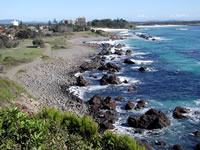Environmental Management - 3965
Program Summary
Faculty: Faculty of Science
Contact: www.bees.unsw.edu.au
Campus: Sydney
Career: Undergraduate
Typical UOC Per Semester: 24
Min UOC Per Semester: 3
Max UOC Per Semester: 27
Min UOC For Award: 144
UAC Code: 429540
Domestic Entry Requirements: See Domestic Entry Requirements
International Entry Requirements: See International Entry Requirements
Award(s):
Bachelor of Environmental Management
View program information for previous years
Program Description
Program Objectives and Graduate Attributes
Program Structure
|
TOTAL OF 144 UoC
|
120 UoC
|
* An approved Major (listed below)
* Compulsory courses (listed below)
* Directed Electives (listed below)
|
|
12 UoC
|
* Free electives: these courses can be taken from any Faculty of the university.
|
|
|
12 UoC
|
* General Education courses: these courses cannot be Science courses.
|
Stage 1
- MATH1041 Stats for Life & Soc Sciences (6 UOC)
- MATH1131 Mathematics 1A (6 UOC)
- BIOS1101 Evolutionary & Functional Bio (6 UoC)
- CHEM1011 Chemistry A (6 UoC) or CHEM1031 Higher Chemistry A: Atoms, Molecules, and Energy (6 UoC)
- CHEM1021 Chemistry B: Elements, Compounds and Life (6 UoC) or CHEM 1041 Higher Chemistry B: Elements, Compounds and Life (6 UoC)
- GEOS2821 GIS (6 UOC)
- LAWS9801 Environmental Policy and Law (6 UOC)
- MGMT2721 Managing People (6 UOC)
- BIOS6671 Biodiv. & Cons. of Nat. Res. (6 UOC)
- GEOS3911 E.I.A. (6 UOC)
Sample Program
General Education Requirements
Honours
Students seeking to enrol in Honours are required to have completed all the requirements for the B. Env. Mgmt. and satisfied all prerequisite requirements for Honours as specified by the relevant School. Students should check prerequisite requirements for Honours with the relevant School and consider potential projects and supervision as early as possible.
It is recommended that students who are granted admission into the BSc Honours Program delay their graduation from 3965 until after they complete Honours and so graduate with Bachelor of Environmental Management in [name of Major completed] and Bachelor of Science (Honours) in [name of Honours Plan completed].
The completion of Honours is a typical pathway for students who wish to undertake a postgraduate research qualification.
The B. Env. Mgmt. and Honours in Environmental Management is also articulated with the Masters of Environmental Management (Program 8623) and the nested Graduate Diploma (Program 5499) and Graduate Certificate (Program 7339). Students who have completed the B. Env. Mgmt. may receive recognition of prior learning and some Advanced Standing in these postgraduate coursework programs.
Academic Rules
2. Students must complete a core set of courses in the B. Env. Mgmt. that totals 120 UoC. This core must contain 60 UoC from the compulsory course list plus one approved Major and courses from the Directed Electives list such that the compulsory courses plus approved Major plus Directed Electives totals 120 UoC. The remainder of courses for the single degree are Free Electives (that may be taken from any Faculty of the university) and General Education.
3. Students must complete all courses on the compulsory course list, an approved Major and Directed Electives to total 120 UoC. Please note that a course can only count once across these three categories: if a course is completed as a compulsory course or within an approved Major you must take additional Directed Electives so that the compulsory courses, approved Major and Directed Electives totals 120 UoC.
4. The 60 UoC of compulsory courses in the B. Env. Mgmt. Program are listed under “Program Structure” above.
5. The approved Majors in the B. Env. Mgmt. Program are:
7. The Directed Electives in the B. Env. Mgmt. Program are:
- ARTS1240 Environment & Society (6 UoC)
- ARTS1241 Environmental Advocacy and Activism (6 UoC)
- ARTS2240 Environment and Development (6 UoC)
- ARTS2244 Rethinking Wildlife (6 UoC)
- ARTS3241 Environmental Justice (6 UoC)*
- ARTS3242 Environmental History (6 UoC)*
Students who do not undertake the Geography approved Major in the B. Env. Mgmt. can also use the following courses towards their Directed Electives:
- GEOS2241 Peak Carbon: Climate Change and Energy Policy (6 UoC)
- GEOS2641 Urban Environments (6 UoC)
- GEOS3921 Coastal Resource Management (6 UoC)
8. No student may normally commence Level 2 courses until 24 UoC Level I have been successfully completed unless approved by the Program Convener or Associate Dean (Undergraduate Programs).
Fees
Award with Distinction
Pathways after Completion of the 3965 Program
Students seeking to enrol in Honours are required to have completed all the requirements for the B. Env. Mgmt. and satisfied all prerequisite requirements for Honours as specified by the relevant School. Students should check prerequisite requirements for Honours with the relevant School and consider potential projects and supervision as early as possible.
The completion of Honours is a typical pathway for students who wish to undertake a postgraduate research qualification.
The B. Env. Mgmt. and Honours in Environmental Management is also articulated with the Masters of Environmental Management (Program 8623) and the nested Graduate Diploma (Program 5499) and Graduate Certificate (Program 7339). Students who have completed the B. Env. Mgmt. may receive recognition of prior learning and some Advanced Standing in these postgraduate coursework programs.
Faculty of Science Rules
Area(s) of Specialisation









